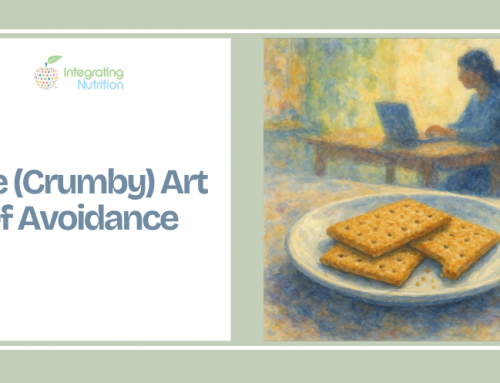Part One
Too many people assume that eating disorders and disordered eating are rooted in laziness or character flaws. These wide-spread assumptions often lead to fat-shaming and feelings of low self-worth. But these beliefs are as damaging as they are untrue.
One of the most fundamental parts of my work with patients is explaining to them how and why the eating issues people tend to struggle with are not their fault. This is a major principle at the core of my book.
So I was pleased to see that a recent UCLA study explored an aspect of this issue in depth.
UCLA’s Study Linking Loneliness With Food Cravings
The experimenters gathered a group of premenopausal women from Los Angeles to explore how loneliness might influence their brains when it came to craving certain foods—sweets in particular. Their findings were eye-opening. When women who reported feeling lonely viewed images of higher-calorie, sweet treats—chocolate cake, for instance—certain parts of their brains were unusually active.
Specifically:
- The inferior parietal lobule (the parts of the brain that are associated with over-thinking and rumination) were highly engaged.
- The occipital cortex, (the part of the brain in charge of visual information,) was also triggered.
On the other hand, the sections of the brain that were less active were sections of the prefrontal cortex, the areas that deal with reasoning and executive control. (This all was in comparison with women who reported that they were less lonely.)
What the researchers concluded
They found that women tend to seek sweet, higher calorie, comfort foods to ease the emotional pain of loneliness. Sweet foods, after all, trigger the brain’s reward system, making them particularly attractive for someone who is feeling isolated. Sweets offer a quick dopamine hit, creating an emotional “boost,” as well as a serotonin response that stabilizes mood. (The fact that these dynamics are triggered by emotional upset is why I prefer to use the term “Emotion-Triggered Eating,” rather than “emotional eating.”)
Though this research focused on women, the team plans to launch a similar study with men. They’re also thinking about long-term studies to track these eating behaviors over time. But whether or not further studies are conducted, this research reinforces an observation I’ve had for years: anxious emotions like loneliness seem to impair the brain’s ability to control cravings. This makes sweet, higher-calorie foods feel like a defense against uncomfortable feelings—at least temporarily.
But why is that?
Built-in Survival Mechanisms and Food Cravings
To understand why eating disorders are not a personal failing, let’s look back a few hundred thousand years.
Humans evolved in close-knit social groups where cooperation and support were crucial to survival. For our prehistoric ancestors, social isolation posed serious threats.These threats included increased vulnerability to predators and a lack of access to essential resources. Being abandoned by one’s tribe could literally be life-threatening.
Calorie-dense foods, especially sweets, were scarce and valuable in these early environments. (The lush fruits that are so plentiful today were neither lush nor plentiful in those ancient, pre-agricultural days.) Foods higher in calories served as quick energy sources. Theyhelped maintain reserves, especially in uncertain times. This is why our ancestors developed a dopamine response (a pleasure response) when they discovered calorie-dense foods—it motivated them to seek out these rare sources of energy. It follows that individuals who felt abandoned, or at risk of being abandoned, would gravitate toward calorie-dense food. When early humans felt isolated, their brains interpreted such isolation as a survival threat. This triggered cravings for energy-rich foods.
These Old Survival Mechanisms Still Persist
At our core, we still contain the same behavioral programming our ancient ancestors had. Which is why the same behavior can appear today when we feel isolated or threatened. Such cravings for sweet, higher-calorie foods that we experience today aren’t personal “failures.” They are remnants of survival mechanisms. Our brains are wired to ease emotional distress by seeking comfort in ways that don’t reflect modern circumstances.
With all that in mind, we’ll end this week’s blog with a few takeaways:
- Eating disorders and disordered eating aren’t personal failings. They’re often linked to emotional states and in-born biological survival mechanisms common to us all.
- Our brains evolved to respond to loneliness by seeking energy-dense foods, creating cravings that helped our ancestors survive in harsh conditions.
- Loneliness and social isolation can trigger the brain to crave higher-calorie, sweet foods as a way to find temporary comfort.
So the good news is: Eating Issues Aren’t Your Fault…
And the challenging news is: Getting Past Them is Completely Up to You
Stay Tuned For Part Two
Stay tuned for Part Two, where we’ll explore practical steps for overcoming these emotion-triggers.





